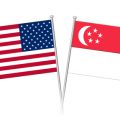SingaporeCompanyIncorporation.sg, a portal for Singapore company registration services, has today published a comparative report on doing business in Singapore and Malaysia. The report is designed to help companies, including those based in Malaysia, determine which country offers a better business ecosystem for growth.
The report referred to data from World Bank’s 2014 ‘Ease of Doing Business’ report and World Economic Forum’s Global Competitiveness 2013 – 2014 as well as 2014 Global Enabling Trade reports. It measures five indicators, namely intellectual property protection, foreign investment friendliness, corporate tax rate, company incorporation, and workforce. The findings are outlined below.
Foreign investment friendliness
In order to attract investments, a country should first have regulations to protect investors. In the Doing Business report, the Strength of Investor Protection Index measures the transparency of transactions, the shareholders’ ability to sue officers and directors for misconduct and liability for self-dealing. Singapore scored 9.3 out of 10 while Malaysia scored 8.7. This places Singapore in the 2nd position worldwide and Malaysia at a close 4th in the category of protecting investors.
In addition, Singapore’s greater emphasis on compliance as well as transparency will continue to ensure wealth protection for genuine investors. The ongoing efforts to improve financial reporting standards, fight wilful tax evasion and financial crimes, as well as to comply with international standards FATCA and BASEL III will also help to attract more bonafide foreign investments.
Intellectual property protection
Intellectual property protection is another factor that motivates investors to inject capital into companies and is crucial in an innovation and knowledge-based economy. The Political & Economic Risk Consultancy Report 2011 and the International Property Rights Index 2012 have formerly ranked Singapore as the top jurisdiction in Asia for intellectual property (IP) protection. According to the Global Competitiveness Report, Singapore is the second best in the world and first in Asia for IP protection. The GCR ranked Malaysia at 30th position.
Workforce
Malaysia has made great improvements in terms of labour market efficiency. According to the GCR, Malaysia has improved its score in 6 out of 10 indicators, and scored well in 8 indicators. As a result, it was ranked 25th worldwide in this category.
Nevertheless, Singapore scored very well in 9 out of 10 indicators, earning it the top position for ‘Labour Market Efficiency’. Both countries did not score well for women’s participation in the labour force. Singapore ranked 84th in this category, while Malaysia ranked 121st.
Opportunities and challenges in Malaysia
Malaysia has made significant economic progress and is now hot on the heels of its neighbour Singapore. The Doing Business report ranked it as the 6th easiest place to do business and the country has made stellar progress, especially in the areas of dealing with construction permits, getting electricity, getting credit and starting a business.
Furthermore, Iskandar Malaysia, just north of Singapore, is set to provide a hinterland for Singapore-based businesses. According to a news report on Today titled ‘S’pore, M’sia trade grows on Iskandar activities,’ Singapore businesses are encouraged to explore Iskandar as a place to expand their operations. Singapore is a major investor in the zone, having injected US$24 billion into projects there.
However, the GCI has cited inefficient government bureaucracy, corruption and poor work ethic in national labour force as the most problematic factors for doing business in Malaysia.
“Although Iskandar Malaysia looks like a natural choice for Singapore companies, there are still some obstacles to doing business in the zone. In general, Iskandar looks promising but Singapore is still well-positioned to function as the shop front or headquarter for businesses in Asia. Its relationship with Malaysia opens up the way for businesses to move easily across borders. At the same time, by being based in Singapore, companies can benefit from stronger intellectual property protection, lesser tax payments, faster construction procedures and smoother insolvencies,” opined Ms. Cheryl Lee, Operations Manager at SingaporeCompanyIncorporation.sg.
To view the full report, please visit https://www.singaporecompanyincorporation.sg/reports/doing-business-in-singapore-vs-malaysia/





